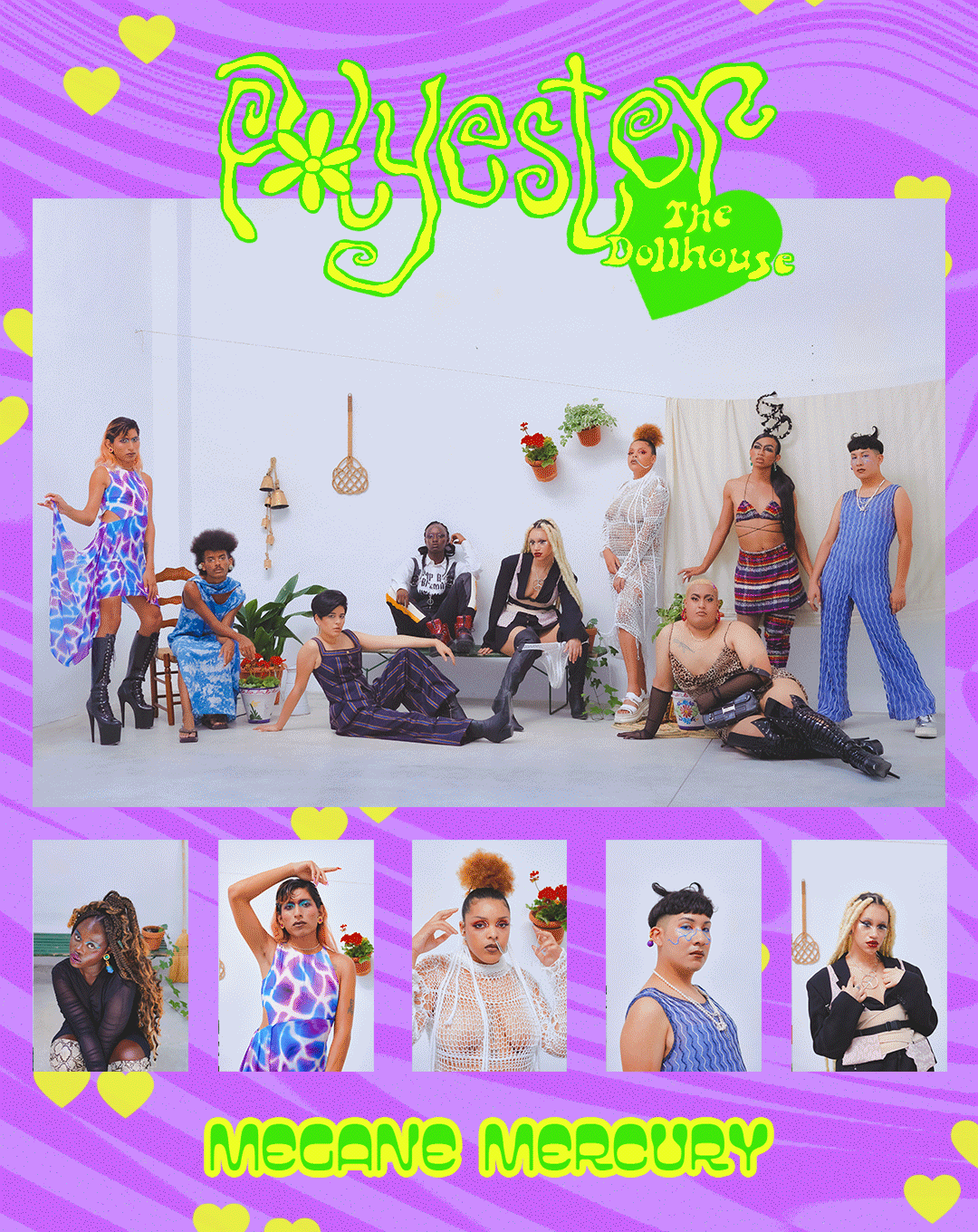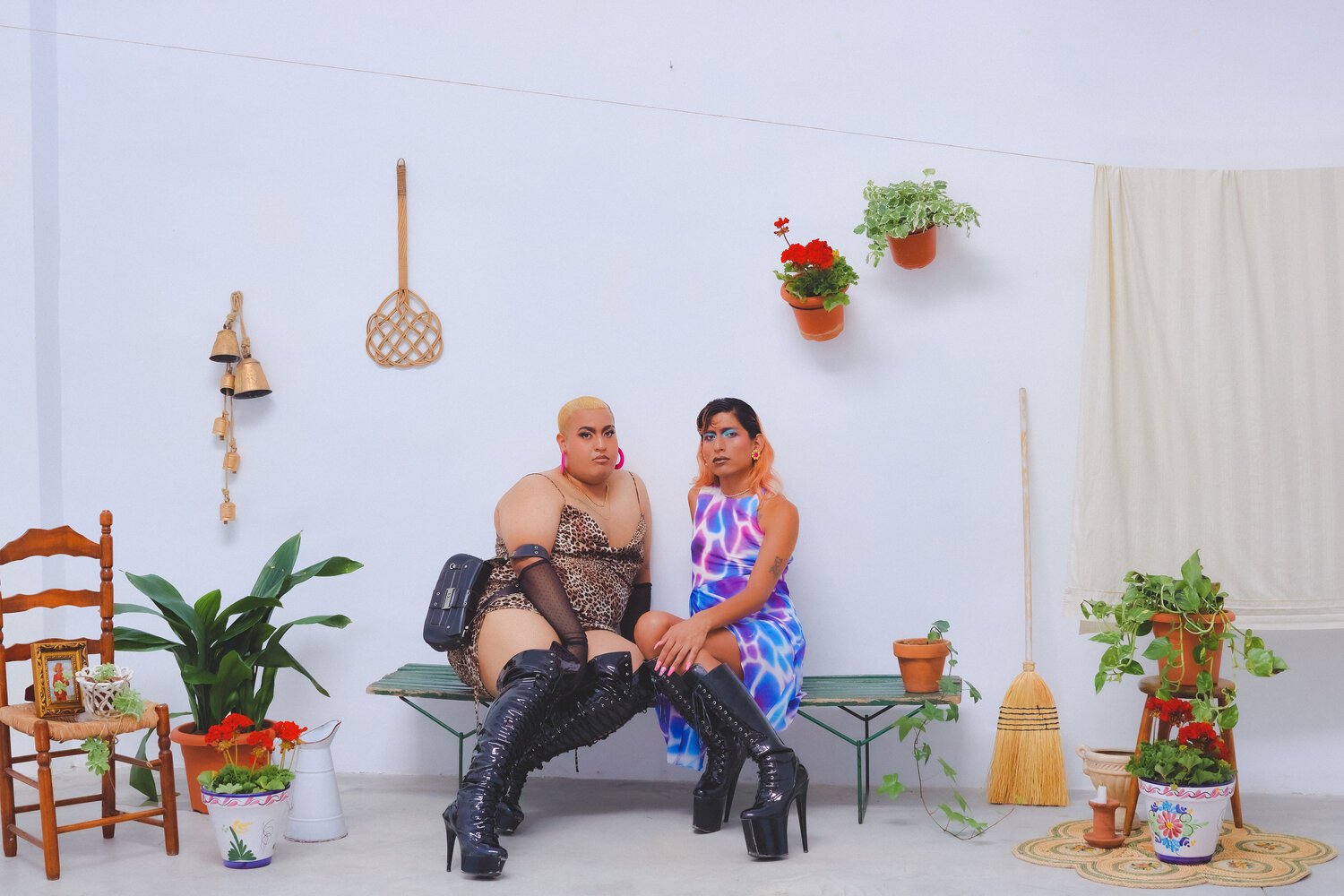Megane Mercury & Queer Community in Madrid
Make it stand out
Megane Mercury is a multi-disciplinary artist based in Spain: They’re a model, photographer, videographer and musician. Honestly, you name it, Megane does it. They are also the winner of our Queer Creative Fund in collaboration with Monki and this month’s Dollhouse cover star. Though Megane works within several different artistic disciplines, a common thread runs through all of their work: the exploration of race and gender through different perspectives.
There’s always this fear as a person of colour that If you are not highlighting your community or the struggles they’ve gone through in your work, you are somehow misusing your voice. Megane rejects this notion. “It’s true that race, gender and sexuality are very present in my work - from representation to deeper and more intricate stuff - but it really depends on the project.” Megane explains, “For instance, my last EP was about my experiences and traumas related to a past relationship. I want to explore anything that moves me, that I find interesting or that is funny to me.” Megane refuses to be boxed in, and rightly so.
In order: navxja: Multidisciplinary artist, Oumou: model and event organizer, sketchylis: Digital artist and illustrator
Megane confesses that even though they’ve indulged in the arts since childhood, they struggled to truly see themselves as an artist. “When I was a kid, I didn’t see myself as a creative. I loved to sing and act and got into photography when my sister got a reflex camera that I used for taking selfies. But even then, I didn’t really recognise photography as a creative tool. All I really knew was that I liked it.” It wasn’t until Megane was faced with those scary questions we are all faced with at 17 or 18: ‘What do you want to study at university?’, ‘What do you want to do with your life?’ that they started to think seriously about the arts and themselves as a creative.
“I thought I was going to do something related to IT at university, but I decided against it.” They tell me, “Instead, I studied audiovisual studies - I did drop out of college sometime after, though, but that’s a long story!” Universities and colleges are hotbeds for racism, classism, and so much more. Places of education meant to inspire the next generation tend to crush their students of colour or neglect them. Megane is proof that you don’t need traditional education to be a successful artist, nor do you need it to create thought-provoking work.
Since college education wasn’t for them, Megane decided to educate themselves. “Though college did teach me some technical stuff that has been useful, I mostly used YouTube to learn.” Megane also advises other artistic folk who are considering alternative academic routes to be patient with themselves and their progress in the creative world. “Patience is key. The world is your teacher. Never stop learning. Most importantly, apply what you are learning to all your projects. This will ensure that you are always pushing yourself to go further than you were before.” Though being their own teacher can be tedious, Megane stresses that their art provides them with strength - “I get to put what I want into something and materialise it. That is so satisfying to me.”
In order: Riri Ratata: Voguer, performer and DJ, Nayare Soledad Otorongx: Travesti, trans-disciplinary artist and poet
The creative world can be lucrative for some and not so lucrative for others, particularly LGBTQIA+ people of colour. This can discourage the most marginalised from participating or even seeing a future for themselves in this industry. However, Megane truly believes that “you don’t need professional equipment” to produce quality work. “I would say that the first thing you need is at least a camera and a laptop, or someone who can lend you that stuff.” They continue, “I don’t have a full-frame camera, I’m just using what I’ve got, and it still gives me good results! Well, I think so anyway.”
“This opportunity has made me feel seen and valued as an artist. That is [a fear] I used to - and still struggle - with a lot.” As the winner of our Queer Creative Fund, Megane argues that while funds and grants provide necessary financial support, they also provide much more than that. “The process of applying helps you develop ideas more coherently onto paper. It also teaches you how to sell yourself and your work. So always stay tuned for funds and grants.”
Baddie: Dancer, performer and model
Megane tells me that if they didn’t have to work to survive, they would focus more on archival pieces and still pursue photography - “I would probably go to more places and take more photos. I love to photograph anything and everything, from buildings I see in the street to skyscrapers. I normally carry a compact film camera with me wherever I go.”
In Spain, Megane tells me, “Work done by artists of colour is often ignored, especially if you are queer. We often see whitewashed stories about people of colour told by white people that don't fully understand what racism is and use racist tropes.” This pushed Megane to create the work they wanted to see. “At some point, I just decided that I was going to do it by myself or at least to have some control of it.”
In order: Nayare Soledad Otorongx: Travesti, trans-disciplinary artist and poet, Ezekiel Monjes: Visual artist, Anna Fux: Visual artist and writer, Oumou: model and event organiser, sketchylis: Digital artist and illustrator, navxja: Multidisciplinary artist, Gad Yola: Drag artist, Galaxia: Artist, performer, event organizer and makeup artist, Riri Ratata: Voguer, performer and DJ
Megane’s love for what they do is infectious. I literally want to step away from my desk and experiment with a different art form right now. They explained that this digital cover is already their most favourite project to have worked on. “Other than this digital cover, I’m so proud of my last EP, ‘Desamor y Pop-Rock para Adolescentes' (Heartbreak and Pop-Rock for Teenagers).” They continue, “The project process made me think about who I am, where I come from, and where I am going. The EP has motivated me to create a zine called ‘Familia' in which I use old images of me, my family and all types of moments from the past that are important to me. This project is important to me because I’m opening my heart, expressing my feelings and telling my story. I get to be honest with myself.”
Original idea, direction & photography: Megane Mercury | Creative direction: Megane Mercury, Proborjativo, Isabella Mena & Carolina Collado | Photography assistant: H. R. Román | Stylists: Proborjativo & Isabella Mena | Stylists' assistants: Juan Varela Duarte & Marina Gomes Gutiérrez | Makeup: Andrea Egido, Brais García Martínez & Lu de la Fuente | Hair: Ghetto B | Gad Yola's wig: Brais García Martínez | Art direction & set designer: Carolina Collado | Art assistant: Rita Lancho | Video: Flor de Cuchillo | Location: Le Bâtiment Studio
Models: Gad Yola, Ezekiel Monjes, Galaxia, navxja, Baddie, Oumou, Nayare Soledad Otorongx, Anna Fux, sketchylis, Riri Ratata
Special thanks to: Belial Naranjo Martín, Onyx, Pelonio, La Gasca Outlet, Blend Showroom & WAG1 Studio





